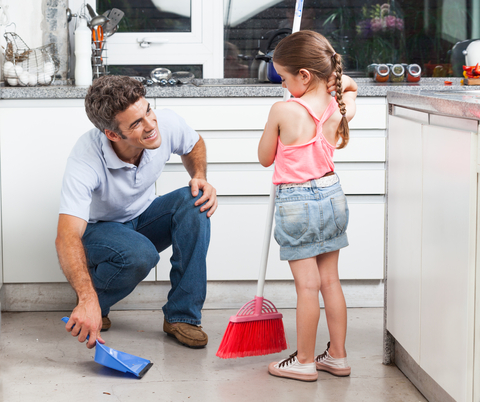
Are you wondering when your children will be ready to help with household chores? My family’s bumpy experience may help you decide that now is the time.
My family was terrible at sharing household chores with children because my husband and I took completely different approaches when the children were very young. I remember the conversations I had with my husband.
“Let her help you wash the dishes.”
“It’s easier just to do it myself.”
He was right. It is easier and faster to just do it yourself. The point wasn’t to get the work done, though, but to let children learn the work, to let children learn that they are important to the functioning of the household.
Once they hit a certain age, my husband expected them to do chores, but they didn’t have a strong pattern of helping yet.
“Ah! So, that’s what you meant.”
We had to work to bridge the gap between parents’ expectations and childrens’ habits. We caught up later than I would have liked, but now each person in the family has responsibility for certain areas.
We don’t have a perfect system. When there is a bigger job, the two teenagers moan about having to help one another, but they often help one another anyway. We have a generally functional and moderately liveable household, and my children feel ownership and responsibility for the housedold—a household that is messier than I’m happy with but cleaner than others might be willing to live with. (Ahem.)
Where to Start Children with Chores
Start when they start. When a child plays alongside you working—washing dishes or folding laundry—share your chore with your young child. It’s play for your child at this stage, but it also helps them learn the vocabulary of work around the house.

Play in parallel to your work. A toddler wants to do what you are doing, so they will pretend to do your work. The kitchen is an ideal place to make a space for a toddler to play at your work. We made a simple kitchen out of cardboard boxes, and my children spent a lot of time there while I was in the kitchen. That wasn’t as fancy as the beautiful wooden kitchen sets we carry at bynature.ca. We find that toddlers want toys that let them be part of the flow of the family.
Grow as they grow. Make assigned chores age- and person-appropriate. A toddler can carry folded laundry, but it might not arrive folded. If you don’t mind that, it’s a simple job. The younger the child, the simpler and more specific the chores need to be. You could make their chores dependent on an adult. “When I pour out the dog’s food, you put the bowl down and feed her.” An older child, especially one who has been doing chores in parallel with an adult already, needs less specific instruction. My children gradually figured out how to wash their own clothes then fold and distribute clothes to the whole family. That involves a string of many tasks, each of which they did separately before they just stepped in to take care of laundry. They actually divided laundry between themselves, with one gathering and starting the washer and the other drying and carrying laundry to the bed, where they fold together.
Don’t expect perfection. Thank your child specifically for what they did and how they did it. Rather than “You didn’t do that as well as I would have,” you could say, “I like how you scrubbed and rinsed each plate. Thank you for doing that.” It’s about more than just getting the job done.
Explain the role. Don’t just focus on the immediate task, but explain the role your child plays. “We all live here, and we all help one another.” I want my children to understand that they are important within the whole family.
Explain the goal. Like explaining the role, I like my children to get the big picture with the goal behind their chores. The goal isn’t to move an armful of recycling to the garage; the goal is to clear the counter so we cook in a clean and clear space. The goal isn’t to spend one hour weeding; the goal is to clear the old plants from the garden before winter. (This was a conversation just yesterday as my son and I walked through our garden that is full of both last year’s dried plants and this year’s optimistic yet confused little flowers. We failed to clear the garden before winter.)
Make it fun. When everyone is cleaning together, we turn on music, and we all sing along. It makes us sound like the von Trapp family, but it’s more like 80s karaoke. Our attitudes as adults toward household chores will rub off on our children.
Make an assignment. To make it easier to remember and to help your child feel more responsibility for the work, assign chores and acknowledge the assignment until everyone remembers.
It’s All Part of the System
Chart? I have tried many different chart systems as reminders: magnetic grids with movable pieces, calendars, me hovering over everyone. None of this worked for us. They seem to work for others, though, so I think they are worth trying for your family.
Domains. What has worked for us is dividing chores into four general domains for the four family members: kitchen, garden, tidying throughout the house, and away from home errands. We do have other jobs, but we own these areas. Once we distributed responsibility, we had less complaining about messiness and fewer questions about who would remedy the situations.
Meeting. Our new family meeting routine gives us a space to talk about non-routine chores or figure out why things aren’t getting done.
For example, I have a black dog and light blue carpet. Dog fuzz shows. My son is responsible for keeping the floor clean.
“Why isn’t the carpet clean?”
“I can’t use the vacuum because there aren’t any vacuum bags.”
So, my husband is assigned the task of chasing around the city to find a vacuum bag that fits our ancient vacuum, then the floor is clean—or will be clean, since we finally got the bags yesterday.
When we’ve done 30-day challenges to tackle certain difficult areas of our house, we all pitch in.
Everyone in my family participates. We don’t all do equal work, but we do all feel free to ask for help when the work is more than we can handle. It took a while to arrive at a smooth(ish) system.
I hope sharing how we got here will help you as your young children learn to participate in household chores.
Image © Mast3r | Dreamstime.com – Father And Daughter Cleaning In The Kitchen Photo

Great tips on getting children involved in chores in the household! It is definitely important to make the chore fun like you said. Thanks for sharing!